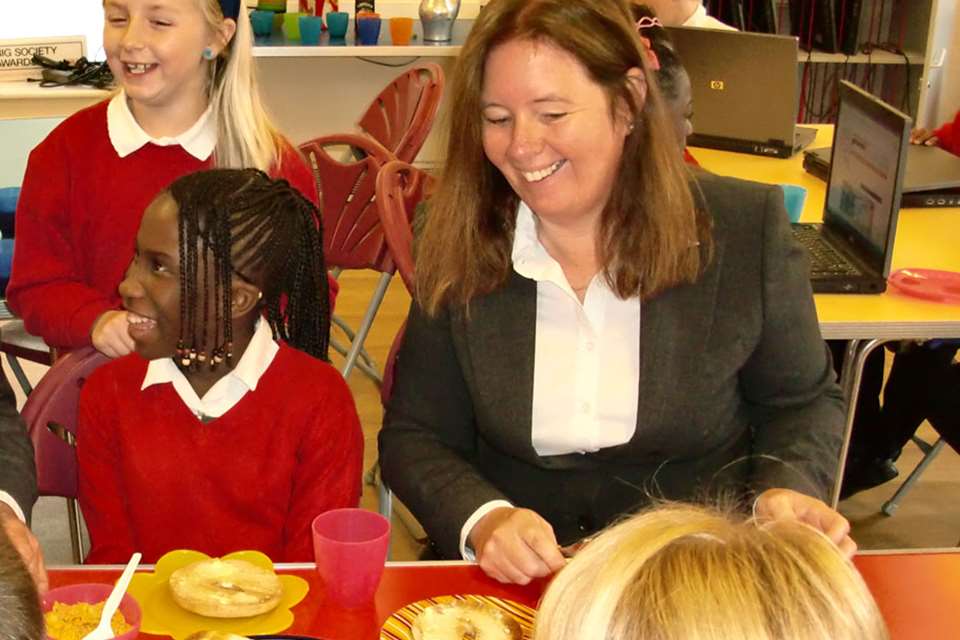Cost of Tory free breakfast plans 'could treble'
Thursday, May 25, 2017
The Conservative manifesto pledge of free breakfasts for all primary school children could cost triple the £60m allocated for it, according to education researchers.

The party’s manifesto includes a policy to replace universal infant free school meals with free breakfasts. The Tories said this would save £650m, which would go to school budgets. Bringing in free breakfasts would cost £60m, they said.
After analysing the cost of this manifesto pledge, researchers from Education Data Lab realised that the Conservatives had based their figures on an evaluation of the Magic Breakfast scheme.
This study, by the Education Endowment Foundation and the Institute for Fiscal Studies (EEF/IFS), did not, however, include the cost of staffing the breakfast clubs.
Magic Breakfast is a charity that runs breakfast clubs in deprived areas and relies on donated food.
The Conservatives have said that the £60m figure is based on take-up of 25 per cent, and that they will set up breakfast clubs similar to the ones the EEF/ IFS identified as 'useful' as universal infant free school meals.
The analysis by Education Data Lab estimates the average cost of a breakfast at 25p per child - around the same figure used in the Magic Breakfast study.
The researchers based their analysis on the following key assumptions:
- the breakfasts are delivered in an hour-long breakfast club before the start of the school day (including set-up and cleaning time);
- the cost per pupil of food is 25p. This seems to be roughly the cost that the Magic Breakfast evaluation assumes;
- a staff-pupil ratio of 15:1 is used. This is lower than the staffing ratio which appears to have been in place in the schools in the Magic Breakfast evaluation;
- breakfast clubs are predominantly delivered by teaching assistants or support staff, who have to be employed for an extra hour each day, at a cost of £15 per hour (total cost to the school);
- take-up of free breakfasts is 20 per cent.
Combining these factors suggests a total cost of £174m per year, or around £1.25 per pupil who takes up a free breakfast per day.
Philip Nye, a researcher from Education Data Lab, told Nursery World, ’Our view is that even if the take-up is what they’re assuming, it could cost three times as much. We think it could be £174m.
‘Take-up is the great unknown and has the biggest bearing on costs, but even so we think costs will be three times what’s budgeted.
‘There are a lot of unanswered questions [around] facilities, staffing, higher staff ratios for children with special educational needs.’
Schools that participated in the Magic Breakfast trial might have higher take-up than other schools because they had high levels of pupils eligible for free school meals, he said, and so therefore it was reasonable to assume there would be more demand for free breakfasts.
He said that the Conservatives have not provided any detail but that the policy appeared to be based on ‘very unfeasibly low staff costs’.
The researchers based their analysis of costs using ‘a more realistic staff ratio’ of 15:1, he said.
Mr Nye added that generally offering free breakfasts would mean having teaching assistants and support staff to come in for an extra hour that would need to be paid.
‘The numbers of support staff have fallen in recent years and schools don’t generally have staff around at 8am,’ he said. ‘Teaching staff are there to prepare lessons not breakfast.’
Impact on childcare
The researchers also say that the take-up of free breakfasts could also have an impact on parents’ use of childcare, particularly for childminders who tend to do drop-offs for parents at school.
Providing breakfast before regular school hours might be seen by some parents as a substitute for morning childcare. This would suggest that take-up might actually be highest in areas where parents already currently pay for morning childcare.
‘It depends on how it gets rolled out by schools,’ Mr Nye said. ‘If it’s just 15 minutes before the school day it’s probably not a big impact, but if they’re delivering it as a school breakfast club an hour before school a lot of parents may see it as a free alternative.
‘We certainly don’t think that take-up will be 100 per cent. Some parents will always want that time together in the morning. We think it will be a mix of deprived families, the ones you hope it’s going to reach, but possibly families where both parents are working and are already paying before school.’
Liz Bayram, chief executive of the Professional Association of Childcare and Early Years, said that while there was no data on the number of childminders that could be affected by the proposal, most childminders look after primary school age as well as younger children, and do drop-offs and pick-up at school, and consequently there was a potential impact. Many community based before-and after-school clubs also offered this service.?
‘If we truly want this proposal to work, PACEY believes the policy should recognise that many children are in registered childcare before school and successful implementation lies in ensuring registered childcare settings as well as primary schools are properly funded to provide free breakfasts,’ she said. ‘Then all children would get their breakfast without placing additional burdens on primary schools.’?
‘But there are a lot of “ifs”. The current debate is a familiar one, is the funding level enough to cover the actual cost of providing a nutritious breakfast? There are many other logistical challenges to primary schools implementing this too. I am sorry that once again, this policy creates an artificial divide between registered childcare provision and schools and continues a growing focus on placing young children in school for longer days.’
In response to the research, a Conservative spokesman said, ‘We will ensure that all primary schools can offer a free school breakfast to every child in every year of primary school as we set out in our manifesto – independent evidence shows this is a cost-effective way to improve education and health results for pupils.
‘More broadly, we will increase the schools budget so that by 2021/22 we will be spending £4 billion more on schools than now. This represents a real terms increase for every year of the Parliament, underpinned by a strong economy.’





